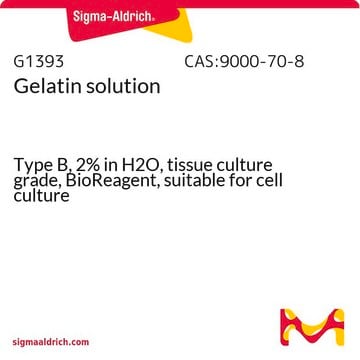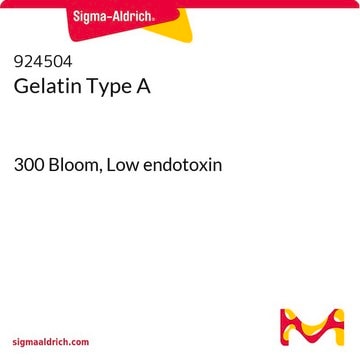918644
Low endotoxin gelatin solution
gel strength (bloom 300)
Synonyme(s) :
Type A, Bloom 300
Se connecterpour consulter vos tarifs contractuels et ceux de votre entreprise/organisme
About This Item
Code UNSPSC :
12352202
Nomenclature NACRES :
NA.23
Produits recommandés
Forme
viscous liquid
Niveau de qualité
Concentration
20 wt. % in DPBS (buffer)
Impuretés
<25 EU/mL Endotoxin
<5 cfu/mL Bioburden
Couleur
colorless to pale yellow
pH
6.5-7.5
Température de stockage
2-8°C
Application
Low endotoxin gelatin solution is a 20% low endotoxin gelatin solution in DPBS buffer. It is sterile filtrated through 0.2 μm sterile filter, and ready to be used in biomedical applications.
Gelatin is widely used for tissue engineering and 3D bioprinting. Gelatin is derived from natural extracellular matrix (ECM) components. Due to its low cost, abundance, and retention of natural cell binding motifs, gelatin has become a highly sought material for tissue engineering applications. Gelatin solution has thermoreversible gelling property which enables synthesis of biocompatible and biodegradable hydrogels and promote cell adhesion, spreading, and proliferation.
Gelatin is widely used for tissue engineering and 3D bioprinting. Gelatin is derived from natural extracellular matrix (ECM) components. Due to its low cost, abundance, and retention of natural cell binding motifs, gelatin has become a highly sought material for tissue engineering applications. Gelatin solution has thermoreversible gelling property which enables synthesis of biocompatible and biodegradable hydrogels and promote cell adhesion, spreading, and proliferation.
Conditionnement
10 mL in glass bottle
Code de la classe de stockage
10 - Combustible liquids
Classe de danger pour l'eau (WGK)
WGK 3
Certificats d'analyse (COA)
Recherchez un Certificats d'analyse (COA) en saisissant le numéro de lot du produit. Les numéros de lot figurent sur l'étiquette du produit après les mots "Lot" ou "Batch".
Déjà en possession de ce produit ?
Retrouvez la documentation relative aux produits que vous avez récemment achetés dans la Bibliothèque de documents.
K W Brunson et al.
Journal of supramolecular structure, 9(2), 231-242 (1978-01-01)
Chinese hamster ovary (CHO . K1 . PRO) cell growth was inhibited by addition of a gram-negative bacterial lipopolysaccharide (LPS) to the cell culture medium. Growth inhibition began after three or four days of incubation, was dose-dependent up to a
T Kirikae et al.
International journal of immunopharmacology, 19(5), 255-262 (1997-05-01)
Trace amounts of endotoxin (lipopolysaccharide: LPS) are assumed to contaminate commercially available fetal bovine serum (FBS) for tissue or cell culture during the manufacturing process. We examined how cultured cells were affected by the endotoxin and how much endotoxin was
J M Harlan et al.
Laboratory investigation; a journal of technical methods and pathology, 48(3), 269-274 (1983-03-01)
Lipopolysaccharide (LPS) produced time- and dose-dependent bovine endothelial cell injury in vitro that was manifested initially by cell detachment from culture substrate with subsequent cell lysis. Bovine endothelial cell injury was observed with LPS derived from Salmonella minnesota R595, a
E J Ziegler et al.
The New England journal of medicine, 307(20), 1225-1230 (1982-11-11)
In an effort to decrease deaths from gram-negative bacteremia and endotoxin shock, we treated bacteremic patients with human antiserum to endotoxin (lipopolysaccharide) core. Antiserum was prepared by vaccinating healthy men with heat-killed Escherichia coli J5; this mutant lacks lipopolysaccharide oligosaccharide
J Ongrádi et al.
Folia microbiologica, 29(6), 450-454 (1984-01-01)
Cytotoxicity of a mixed pyrogen preparation and its components as well as native and radiodetoxified lipopolysacharides (LPS) was determined with established HEp-2 cell cultures and by measuring plating efficiency. This proved to be more sensitive to the damaging effect of
Notre équipe de scientifiques dispose d'une expérience dans tous les secteurs de la recherche, notamment en sciences de la vie, science des matériaux, synthèse chimique, chromatographie, analyse et dans de nombreux autres domaines..
Contacter notre Service technique








